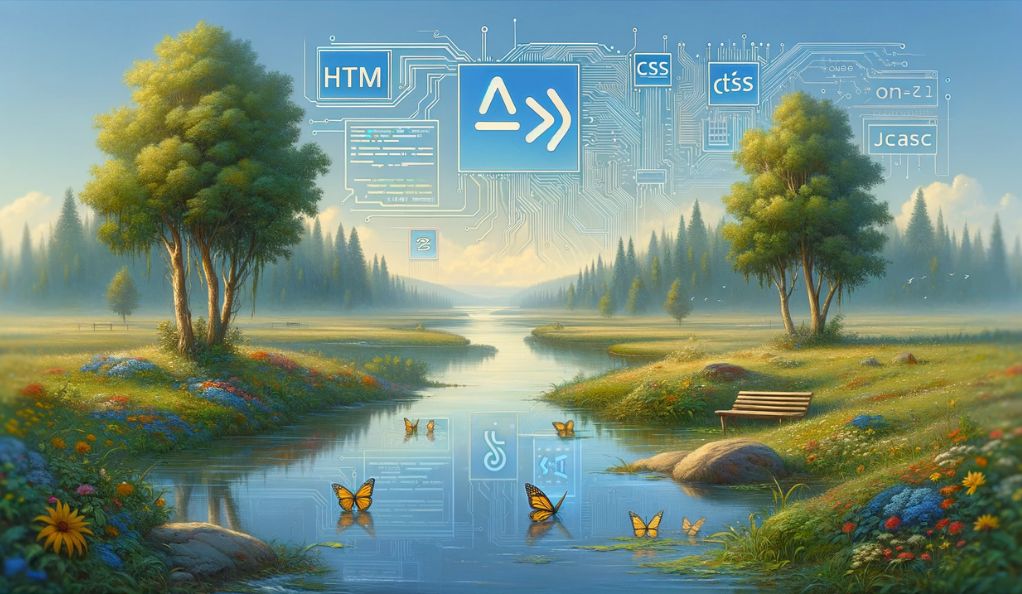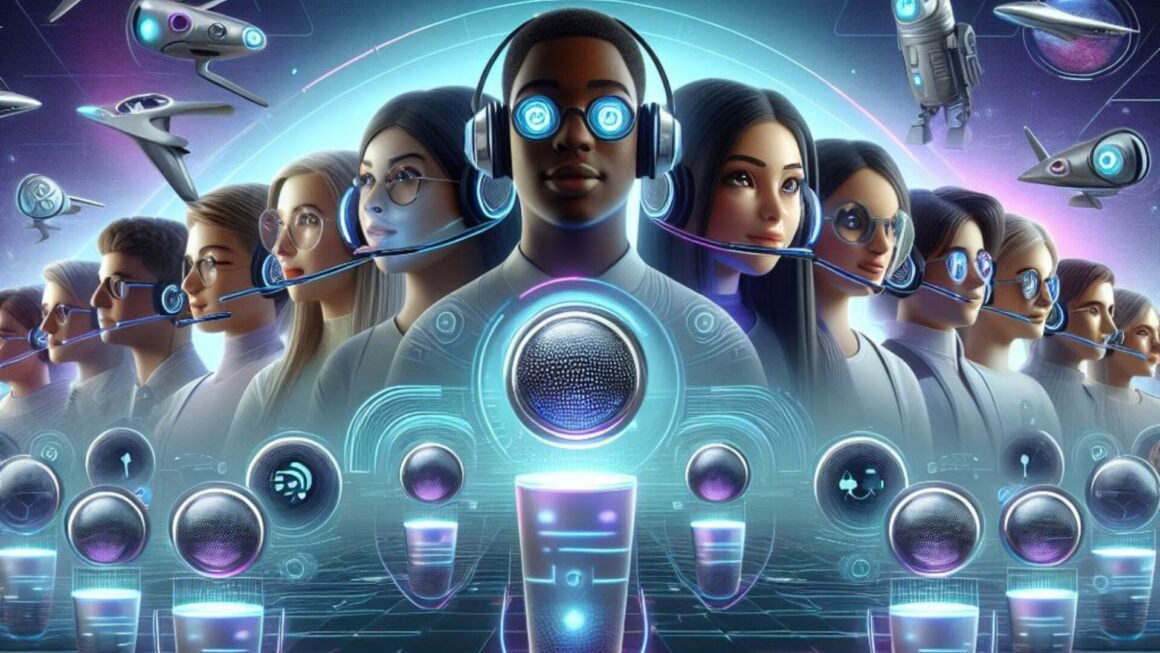The section outlines how AI is redefining traditional web development approaches, particularly in coding with HTML, CSS, and JavaScript, and emphasizes AI’s influence in streamlining the development process, enhancing responsiveness, and improving user experiences. This introduction serves as a foundation for understanding AI’s profound and growing impact on the web development landscape.
The Transformative Role of AI in Web Development
In recent years, Artificial Intelligence (AI) has emerged as a game-changer in various industries, and web development is no exception. This transformative technology is not just a fleeting trend but a cornerstone in the evolution of web design and functionality. AI’s integration into web development signals a paradigm shift, where the creation of websites is no longer confined to traditional coding practices but is instead enhanced by intelligent algorithms and machine learning capabilities.
AI’s Impact on HTML, CSS, and JavaScript
The impact of AI in web development is manifold. It extends beyond mere automation, venturing into realms of predictive analysis, personalized user experiences, and intelligent problem-solving. As web technologies continue to evolve at a rapid pace, AI stands at the forefront, driving innovations that redefine how websites are designed, developed, and optimized for both end-users and search engines. AI-driven tools and platforms are now capable of streamlining the coding process, offering suggestions, and even writing chunks of code, thereby reducing the time and effort required by developers.
Enhancing Responsive Design and User Experience with AI
Furthermore, AI plays a crucial role in enhancing responsive web design. With a variety of devices and browsers used to access websites, ensuring a consistent and optimal user experience across all platforms can be challenging. AI-driven tools aid in creating designs that automatically adapt to different screen sizes and resolutions, ensuring that websites are accessible and user-friendly, regardless of the device used.
The Future of AI in Web Development
As we delve deeper into the realm of AI-driven web development, it’s clear that the technology is not just an enhancer but a catalyst for innovative and more efficient web solutions. From coding to user experience, AI’s influence spans the entire spectrum of web development, paving the way for smarter, more adaptive, and user-centric websites.
The AI Revolution in Coding: HTML, CSS, and JavaScript

The AI Revolution in Coding is transforming the world of web development, particularly in the realm of HTML, CSS, and JavaScript. Artificial intelligence tools and algorithms are streamlining the coding process, making it more efficient and accessible to developers of all skill levels. From auto-generating HTML markup to suggesting CSS styles and optimizing JavaScript code, AI is revolutionizing how websites are built, enhancing productivity, and enabling developers to focus on creativity and problem-solving rather than mundane coding tasks.
Revolutionizing Traditional Coding Practices with AI
The integration of AI in traditional web coding has brought a significant shift in how developers approach HTML, CSS, and JavaScript. AI tools are now equipped to assist in the coding process, providing intelligent suggestions, auto-completion features, and even debugging assistance. This not only streamlines the workflow but also enhances the accuracy and efficiency of the code.
AI’s Role in Optimizing Web Development Workflow
By leveraging machine learning algorithms, these AI tools can analyze vast amounts of data, learn from patterns, and offer solutions that would otherwise require extensive human intervention. They can predict potential issues, offer optimized coding solutions, and even automate routine tasks. This advancement is particularly beneficial for novice programmers, as it lowers the barrier to entry in web development.
Future Prospects of AI in Web Coding
The continued evolution of AI in coding promises even more sophisticated functionalities. We are gradually moving towards a future where AI could potentially take over more complex aspects of coding, further reducing the time and cost involved in web development projects.
AI Tools for Responsive Design

AI Tools for Responsive Design are reshaping the way websites adapt to various devices and screen sizes. These intelligent solutions analyze user behavior, device characteristics, and content to automatically adjust layouts, fonts, and images for optimal viewing experiences. With AI’s assistance, designers and developers can ensure that their websites look and function seamlessly on desktops, smartphones, and tablets, improving user engagement and satisfaction.
Enhancing Web Design with AI for Cross-Device Compatibility
Responsive design is critical in today’s multi-device world, and AI is playing a key role in simplifying this aspect of web development. AI-driven tools and platforms empower developers to create websites that automatically adjust to different screen sizes, ensuring a consistent and engaging user experience across all devices.
Utilizing AI for Dynamic Layouts and Styles
These tools analyze user data and device capabilities to suggest optimal layouts, styles, and content placements. The use of AI in responsive design goes beyond mere scaling, encompassing adaptive design elements that respond to user behavior and preferences.
AI’s Contribution to Cross-Browser Compatibility
Moreover, AI significantly aids in ensuring cross-browser compatibility. By automating the testing process across various browsers, AI tools help identify and resolve compatibility issues swiftly, enhancing the overall functionality and accessibility of websites.
Enhancing User Experience with AI Testing Tools
Enhancing User Experience with AI Testing Tools is revolutionizing the way companies ensure the quality and usability of their digital products. These advanced AI-driven testing tools can simulate user interactions, detect usability issues, and provide valuable insights into user behavior. By leveraging AI, businesses can identify and address potential problems, optimize user journeys, and ultimately deliver a more satisfying and seamless experience for their customers.
Leveraging AI for Advanced Website Testing and Optimization
AI-based testing tools are revolutionizing how websites are evaluated and optimized. These tools employ advanced algorithms to simulate real-world user interactions, providing insights into user experience and website performance.
Personalized User Experiences through AI
AI helps in creating more personalized user experiences. By analyzing user data, AI tools can tailor website content and layout to individual preferences, significantly improving engagement and satisfaction.
Improving Accessibility and Usability with AI
Furthermore, AI-driven testing tools play a crucial role in enhancing website accessibility and usability, identifying potential barriers for users and suggesting improvements. This ensures that websites are not only visually appealing but also functional and accessible to all users.
The Rise of Low-code/No-code Development

The Rise of Low-code/No-code Development represents a significant shift in the world of software development. These platforms empower individuals with limited coding experience to create complex applications and workflows, reducing the need for traditional programming skills. Low-code/no-code tools offer speed and accessibility, enabling businesses to quickly develop and iterate on solutions, ultimately accelerating digital transformation and democratizing software development for a broader audience.
Empowering Creativity with Low-code/No-code Platforms
The advent of low-code and no-code development platforms is a direct result of AI’s advancement in web development. These platforms enable individuals without extensive programming knowledge to create and manage websites and web applications.
Democratizing Web Development through AI
These platforms use AI to provide intuitive interfaces, drag-and-drop functionalities, and pre-built templates, democratizing web development. This approach significantly reduces the time and resources required to bring a web project to life.
The Future of Web Development Accessibility
With AI continuing to evolve, these low-code and no-code solutions are expected to become more powerful, further simplifying web development and making it accessible to a broader audience.
Progressive Web Applications (PWAs) and AI
Progressive Web Applications (PWAs) and AI are forging a powerful synergy in the world of web development. PWAs leverage AI capabilities for personalized user experiences, real-time content recommendations, and efficient data caching. With AI-driven enhancements, PWAs can deliver faster load times, offline functionality, and adaptive interfaces, blurring the line between web and native applications. This integration is reshaping how businesses engage with their audience, offering more dynamic and user-centric web experiences.
Blending the Best of Web and Mobile Apps
Progressive Web Applications (PWAs) represent a significant stride in web development, blending the best features of traditional websites and mobile applications. AI plays a pivotal role in enhancing these applications, making them more efficient and user-friendly.
AI-Enhanced Performance and User Engagement
AI algorithms in PWAs contribute to improved performance, user engagement, and functionality. They enable these applications to operate seamlessly across various devices and platforms, offering an app-like experience in a web browser.
Future Trends in PWA Development
As AI technology continues to evolve, the capabilities of PWAs are expected to expand, further blurring the lines between web and mobile app experiences.
Transforming Customer Interaction with AI-Powered Chatbots and Virtual Assistants
Transforming Customer Interaction with AI-Powered Chatbots and Virtual Assistants is revolutionizing customer service and support. These intelligent AI-driven solutions are available 24/7, providing instant responses to customer inquiries, resolving issues, and even making personalized product recommendations. By harnessing AI, businesses enhance efficiency, reduce response times, and offer seamless interactions, ultimately improving customer satisfaction and loyalty while streamlining their support operations.
// AI Chatbot Initialization
const chatbot = new AIChatbot({
apiKey: 'YOUR_API_KEY',
model: 'default',
onMessage: (message) => {
displayMessage(message);
}
});
// Function to send user's message to the chatbot
function sendMessageToChatbot(userInput) {
chatbot.sendMessage(userInput);
}
// Function to display messages in the chat window
function displayMessage(message) {
const chatWindow = document.getElementById('chat-window');
const messageElement = document.createElement('p');
messageElement.textContent = message;
chatWindow.appendChild(messageElement);
}
// Event listener for user message submission
document.getElementById('send-button').addEventListener('click', () => {
const userInput = document.getElementById('message-input').value;
sendMessageToChatbot(userInput);
document.getElementById('message-input').value = '';
});Revolutionizing Customer Service with AI Chatbots
AI-powered chatbots and virtual assistants are revolutionizing customer interaction on websites. These sophisticated tools use natural language processing (NLP) to provide responses that mimic human conversation, offering a more engaging and efficient customer service experience.
Enhanced Engagement and Data Collection
Beyond customer service, these AI tools are instrumental in increasing user engagement and collecting valuable customer data. This data can be used to further refine marketing strategies and improve overall website performance.
The Evolving Landscape of AI-Driven Customer Interaction
As AI technology advances, these chatbots and virtual assistants are expected to become even more nuanced and effective, playing a crucial role in the future of digital customer interaction.
Conclusion: The Future of Web Development with AI
The integration of AI in web development is not just a current trend but a fundamental shift in how websites are created and maintained. From enhancing coding efficiency to revolutionizing user experience and customer interaction, AI is setting a new benchmark in web development.
As we look forward, the potential of AI in this field is boundless. We can anticipate even more sophisticated AI tools and platforms that will further streamline web development processes, offer richer user experiences, and open up new possibilities for innovation in web design and functionality.
The future of web development with AI promises a landscape where technology not only complements human creativity but also expands the horizons of what is possible in the digital realm.




